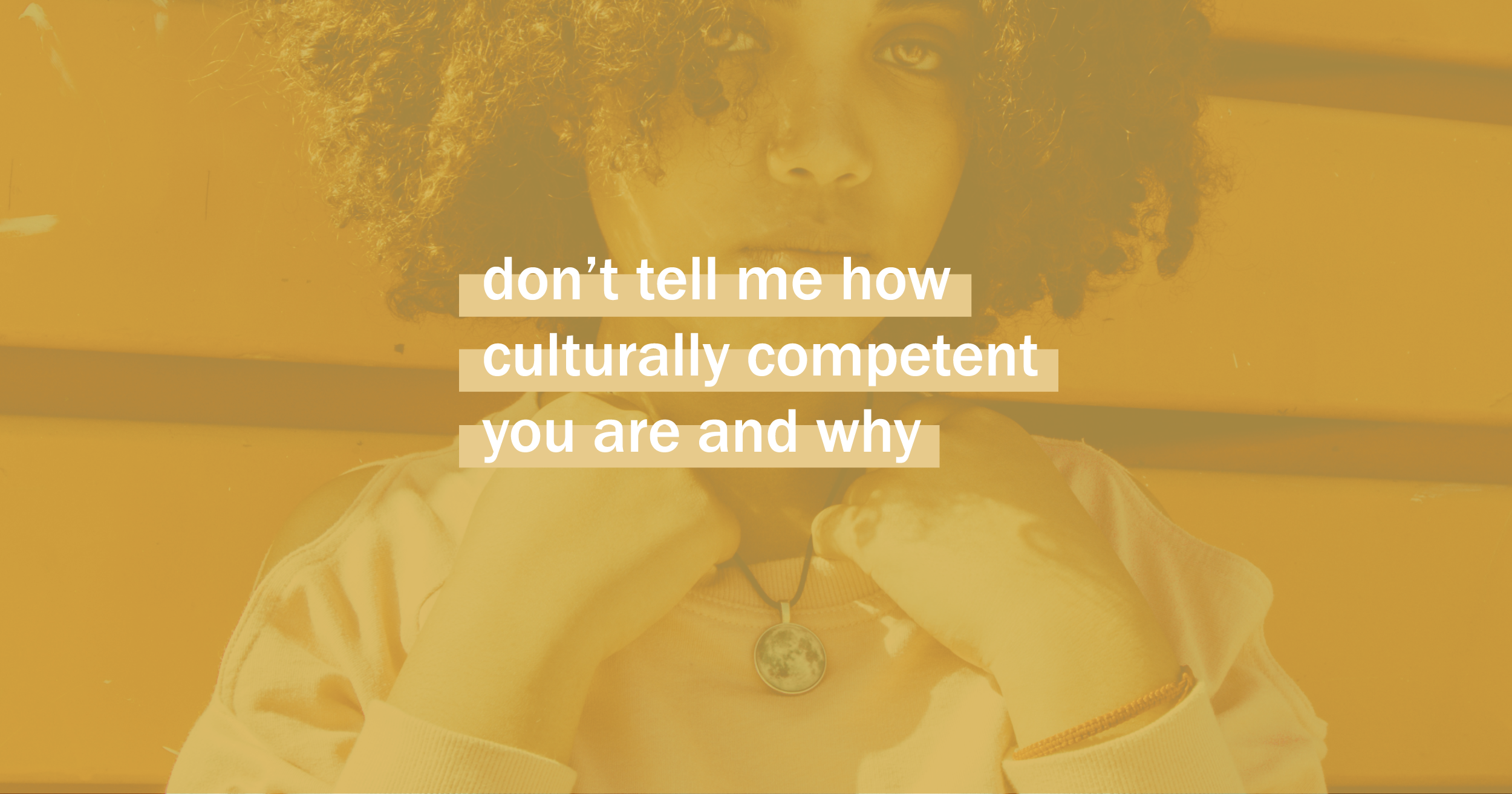Don’t Tell Me How Culturally Competent You Are and Why
Photo by Houcine Ncib on Unsplash
I’ve been having a really hard time lately. All my life I’ve been in spaces like these ones. Spaces where I’m one of a few Black people or people of color, and I have white people around me (often many of whom I like/admire/appreciate) who are asking me for answers to problems that are quite honestly… not the kinds of problems that have bullet-point answers. So what can I say?
What do I say to someone who says to me, “I’ve heard that I need to reach out to you because I need to hear from Black folks, but I’ve also heard that I shouldn’t burden you with the work of asking you these questions?”
“Yes.” I feel for the tension here. Both of those perspectives are valid. I want people to listen to Black voices. I also want people to respect that calling on Black voices means those Black people speaking have to enter the uncomfortable and challenging space of figuring out how to communicate their experience to people who may be hearing about these things for the first time and have push-back to the truth.
It is labor. It is mental and emotional labor, not to mention actual time that you are taking away from hours they could worked, or moments they could have had with friends or family, or self-care that they probably already don’t get enough of. And considering the history of Black bodies and labor… probably a good idea to be very mindful of that.
So then someone says, “I will pay you to talk to me/my group. I know it’s labor, and I will pay you for it.”
Okay. Thanks… I appreciate the consideration. But, now I’m wondering… to what end?
One does not simply become trained in cultural competency (Lord of the Rings reference intentional, hence the meme).
If you’re going to pay me or any other Black person to talk to you so that you can now say to someone else, “I’m trained! I’m qualified! I can work great with Black folks now!” then you’ll be wasting your money and I’ll be wasting my time AND worse, putting my stamp on your misunderstanding of what we’re dealing with.
So then someone says, “So you want me to listen to you. But you don’t want me to always call on you. And you don’t want me to pay you?”
Look, if you and I live in the same city, interact in the same online spaces, have any organic ways of connecting at all — here’s what I want.
I want you to know me. I want to know that there’s no agenda to our communications. That you’re not going to make some big announcement post on Instagram or add to your list of services or raise your rates because we had this conversation.
There are groups that do trainings and that’s great. I’m not knocking trainings. I’m just saying unless I have told you specifically that I am a trainer and I offer this training and you've paid me for said training and it is the day of the training and we are in training…
I am not your training field. I am a human being.
And that’s why I want to know you too. I don’t want to feel tense around you. I don’t want to
have a really hard time knowing what to do with my face when I hear you say that you love all the babies in Africa in a conversation about Black women in America, or talk about the little bit of Blackness in your family member, or the civil rights social justice history of your uncle.
If someone brings you up I want to be like, “Oh! You know Janie too? She’s great, I saw her over at Brewer’s the other day. I think she just had a birth at St. Mary’s but I don’t remember, she was on her way to yoga so we just chatted for a minute — I know I’m trying to get like her with that self-care rhythm.”
See how normal that is? I want to be normal with you.
I don’t want you to think I’m being mean when my face contorts when you say things that I know you have good intentions saying. But I want you to know that I have a hard time hearing those things because they feel incredibly distant from what is going on between you and me in the moments that you say them. Don’t try to tell me how cultural competent you are by building some sort of verbal resume for it.
Cultural competency is the life that you live. It is listening, it is acting, it is evaluating the impact of your actions, listening more, acting more, evaluating more, and on and on and on. And yeah it’s going to be hard and not everyone’s going to love your decisions or approve of them.
But what are you doing this for? Are you doing it for praise? Or are you doing it for impact?
And what is impact? Do you have to be at the center of it? Or could you be satisfied pouring in and stepping back?
I have work to do too. Because our world has raised us to see each other in strict and narrow ways I associate whiteness with connections and resources (often accurately, let’s be real). But because of this sometimes I have to remind myself, look this is a person with an experience, just like I am a person with my experience. I don’t want to take you for granted, either.
I get that White folks are not a monolith any more than Black folks are. I can’t and don’t expect every white person to have the same access and availability. But I absolutely do expect any White person who tells me they want to do better to start showing me.
Like I said, this work is both of ours. But realize this…
While it’s likely that you (White Folks) have been grappling with these issues fairly recently in your life — and as distant potential participants in injustice (like you often say, “I didn’t own slaves / I don’t personally do XYZ / I’m not one of these politicians”) — many POC have been aware and grappling with these issues since around age 10 or younger — as the personal and generational recipients of discrimination.
I specifically remember the day I realized… not just that I was Black but that being Black meant something bad could happen to me or someone I loved. I was 8 years old. So I’ve been at this for almost 20 years.
Sometimes I get angry. Tired. Sad. But I’m still in it… and (though there are some folks I do have to establish boundaries with) I’m in it with you, not against you. So let’s do this thing.












